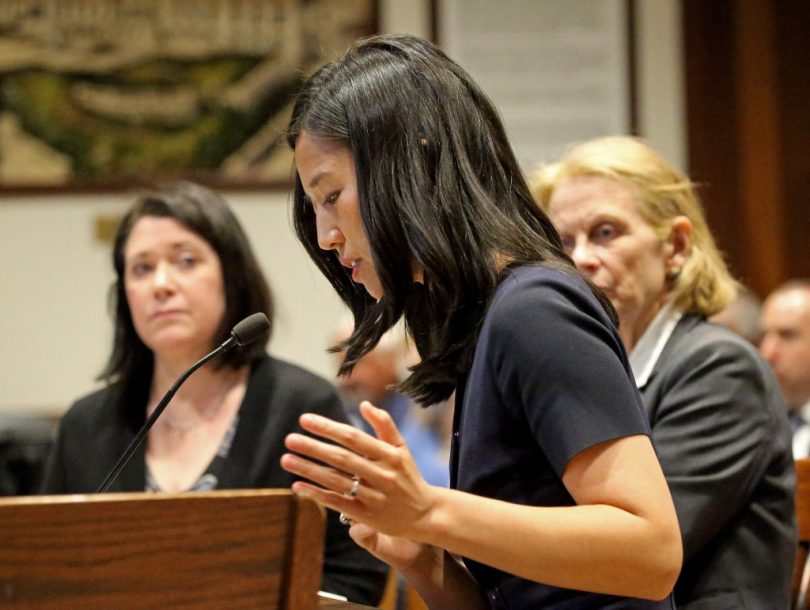[ad_1]
The push has begun yet again to get the state to give Boston permission to slap big-dollar real-estate deals with an additional tax — an effort that’s stalled on Beacon Hill in previous attempts and continues to face opposition from industry groups.
Boston Mayor Michelle Wu summited Beacon Hill on Tuesday to testify before the Legislature’s Joint Committee on Revenue in favor of the home-rule petition that would allow that city to levy a 2% transfer tax on deals over $1 million in the city where renting and buying housing both are so expensive.
City officials told the committee this would raise up to $100 million a year that would be channeled back into building income-restricted housing and help seniors on fixed incomes stay in their homes. The officials said that based on 2021 numbers, the fee would hit about 7% of real-estate transactions.
“Housing costs are the number-one challenge that residents raise with me and the administration,” Wu said, flanked by Housing Chief Sheila Dillon and Age Strong Commissioner Emily Shea. “Housing prices in Boston’s market are right where they were — and increasing.”
Wu and Dillon sought to downplay the tax-side effects, with terms like “de minimis,” “top, top, top 7%” and “very small fee” being offered up on that front. Conversely, they said $100 million could dramatically expand the city’s capabilities on this front.
The Greater Boston Real Estate Board and the Massachusetts Association of Realtors, though, showed up to testify in opposition, both going on the offensive by slamming Boston’s difficult approval process that limits the construction of new housing.
“This is not a funding problem — this is an affordable-housing-production problem,” Dawn Ruffini of the Realtors organization said. “Transfer taxes will harm our communities.”
City Councilors Ruthzee Louijeune and Kenzie Bok both testified in favor of the petition. Boston state pols Sen. Lydia Edwards and Reps. Brandy Fluker-Oakley and Rob Consalvo all spoke in favor, too.
Edwards, who while on the city council was a champion of this petition and the previous iteration, told the committee, “You just gotta give us the opportunity … We don’t have another way of generating this kind of money.” She added that the effect from the tax is “negligible” on production.
State Sen. Nick Collins, also from Boston, didn’t testify one way or the other, but as he asked questions of those in attendance he said he worries about “taking a step in the wrong direction of tax increases” and said the government should “be spending a lot more time prioritizing the spending” of existing funds, like the federal relief dollars and Community Preservation Act money.
The Boston City council passed this latest home-rule petition, which this time around has an additional focus on seniors, earlier this year, and Wu signed it.
This isn’t the first crack at such a fee. Activists were delighted when former Mayor Marty Walsh signed a previous version a couple of years ago after the council passed it. But the petition, which requires the passage of both houses of the Legislature and the signature of the governor, stagnated in the state house, as home-rule petitions are wont to do there.
State Sen. Adam Hinds, co-chair of the committee, seemed to embrace the proposal, saying it appears to be “effective at threading that needle” between raising revenue and not stifling development.
Asked after her testimony, Wu declined to say whether she’s optimistic that this time will be the charm for the proposal.
“The state has a whole lot of priorities they’re juggling, so I can’t begin to understand how they’re making the many decisions that they have to make,” Wu told the Herald outside the hearing.
[ad_2]
Source link








